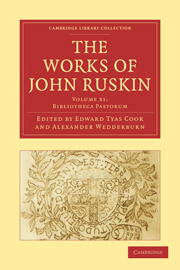Book contents
- Frontmatter
- Contents
- LIST OF ILLUSTRATIONS
- INTRODUCTION TO THIS VOLUME
- “BIBLIOTHECA PASTORUM,” EDITED BY JOHN RUSKIN
- I THE “ECONOMIST” OF XENOPHON. TRANSLATED INTO ENGLISH BY A. WEDDERBURN AND W. G. COLLINGWOOD, WITH A PREFACE BY THE EDITOR (1876)
- II “ROCK HONEYCOMB.” BROKEN PIECES OF SIR PHILIP SIDNEY'S PSALTER. LAID UP IN STORE FOR ENGLISH HOMES. WITH A PREFACE AND COMMENTARY BY THE EDITOR (1877)
- III “ELEMENTS OF ENGLISH PROSODY FOR USE IN ST. GEORGE'S SCHOOLS.” EXPLANATORY OF THE VARIOUS TERMS USED IN “ROCK HONEYCOMB” (1880)
- IV “A KNIGHT'S FAITH.” PASSAGES IN THE LIFE OF SIR HERBERT EDWARDES. COLLATED BY JOHN RUSKIN (1885)
- APPENDIX: SPECIMENS OF RUSKIN'S MUSIC
- Plate section
I - THE “ECONOMIST” OF XENOPHON. TRANSLATED INTO ENGLISH BY A. WEDDERBURN AND W. G. COLLINGWOOD, WITH A PREFACE BY THE EDITOR (1876)
Published online by Cambridge University Press: 07 September 2011
- Frontmatter
- Contents
- LIST OF ILLUSTRATIONS
- INTRODUCTION TO THIS VOLUME
- “BIBLIOTHECA PASTORUM,” EDITED BY JOHN RUSKIN
- I THE “ECONOMIST” OF XENOPHON. TRANSLATED INTO ENGLISH BY A. WEDDERBURN AND W. G. COLLINGWOOD, WITH A PREFACE BY THE EDITOR (1876)
- II “ROCK HONEYCOMB.” BROKEN PIECES OF SIR PHILIP SIDNEY'S PSALTER. LAID UP IN STORE FOR ENGLISH HOMES. WITH A PREFACE AND COMMENTARY BY THE EDITOR (1877)
- III “ELEMENTS OF ENGLISH PROSODY FOR USE IN ST. GEORGE'S SCHOOLS.” EXPLANATORY OF THE VARIOUS TERMS USED IN “ROCK HONEYCOMB” (1880)
- IV “A KNIGHT'S FAITH.” PASSAGES IN THE LIFE OF SIR HERBERT EDWARDES. COLLATED BY JOHN RUSKIN (1885)
- APPENDIX: SPECIMENS OF RUSKIN'S MUSIC
- Plate section
Summary
EDITOR'S PREFACE
1. The Athenian writing, here presented to Saxon readers, is the first of a series of classic books which I hope to make the chief domestic treasures of British peasants. But to explain the tenor, and show the grounds, of this hope, I must say in what sense the word “classic” may be rightly applied to Books, and the word “peasant” to Britons.
The word “classic,” when justly applied to a book, means that it contains an unchanging truth, expressed as clearly as it was possible for any of the men living at the time when the book was written, to express it.
“Unchanging” or “eternal” truth, is that which relates to constant,—or at least in our human experience constant,—things; and which, therefore, though foolish men may long lose sight of it, remains the same through all their neglect, and is again recognized as inevitable and unalterable, when their fit of folly is past.
The books which in a beautiful manner, whether enigmatic or direct, contain statements of such fact, are delighted in by all careful and honest readers; and the study of them is a necessary element in the education of wise and good men, in every age and country.
- Type
- Chapter
- Information
- The Works of John Ruskin , pp. 1 - 98Publisher: Cambridge University PressPrint publication year: 2010First published in: 1907

